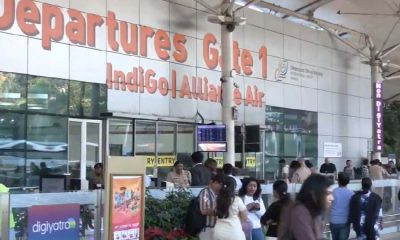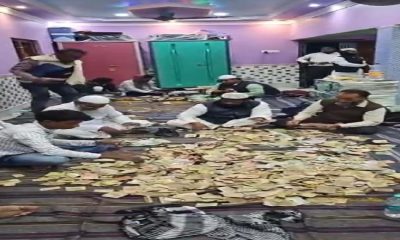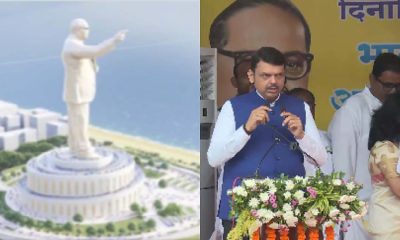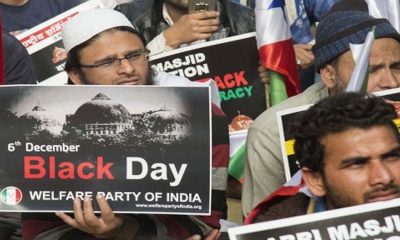National News
PM Modi flags off Pravasi Bharatiya Express, a special tourist train for NRIs
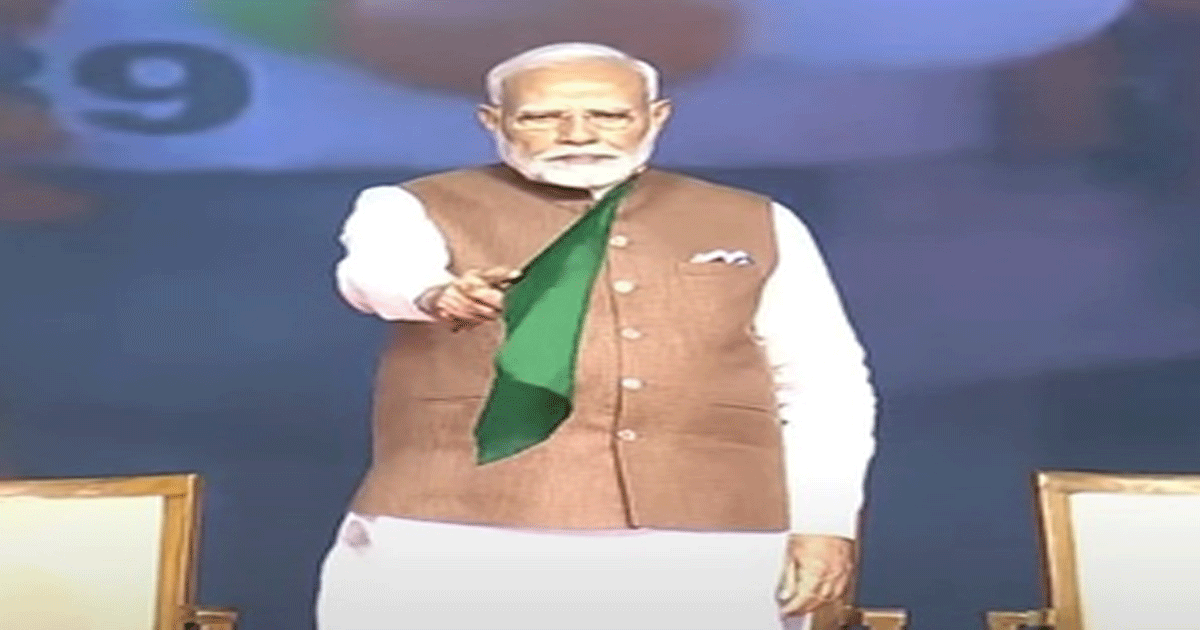
New Delhi, Jan 9: Prime Minister Narendra Modi on Thursday remotely flagged off the inaugural journey of the Pravasi Bharatiya Express, a special tourist train for the Indian diaspora.
The train will travel to various tourism and religious destinations across India over three weeks. This initiative is part of the Pravasi Teertha Darshan Yojana of the Ministry of External Affairs.
The Pravasi Bharatiya Express is a special state-of-the-art tourist train, exclusively designed and built for the Indian diaspora, and that too for the age group between 45 and 65 years.
Starting from its launch day, January 9, the train will travel to multiple destinations across the nation, including prominent tourist and religious places, for three weeks.
The date for flagging off the special train has also been deliberately chosen by the Modi-led government. The date January 9, 2025, commemorates the return of Mahatma Gandhi from South Africa to India on this date in the year 1915.
The departure of the train is from Safdarjung Railway Station in New Delhi and the route is – New Delhi – Ayodhya – Patna- Gaya – Varanasi – Mahabalipuram – Rameswaram – Madurai – Kochi – Goa – Ekta Nagar (Kevadia) – Ajmer – Pushkar – Agra. The train can accommodate 156 passengers.
To connect the Indian diaspora to their roots, this tour is being organised under the Ministry of External Affairs in collaboration with the Indian Railways Catering and Tourism Corporation (IRCTC).
Indian Embassies across the world had invited applications from participants, giving a preference to Persons of Indian Origins (PIOs) belonging to the low-income category who would otherwise not be able to afford to visit India on their own.
A statement of the ministry said that it will bear all expenses for the aforesaid conducted train tour besides also bearing 90 per cent of the return airfares for the eligible people from their countries of origin to India. The participants need to bear only 10 per cent of their return airfares. The travellers will be accommodated at 4-star or similar category hotels as per the tour itinerary.
Crime
Mumbai Airport Customs Seize ₹43 Crore Drugs, ₹1.51 Cr Gold & ₹87 Lakh Diamonds In 15 Smuggling Cases Over Past 8 Days

Mumbai, Dec 10: The Mumbai Airport Customs in 15 cases over the past eight days have seized smuggled drugs worth ₹43 crore, gold worth ₹1.51 crore and diamonds valued at ₹87 lakh.
According to the Customs, during December 03 till December 10 they detected ten cases of smuggling of hydroponic weed.
“Based on spot profiling, a total of 37.26 kg of suspected hydroponic weed valued at approximately ₹37.26 crore in the illicit market were recovered under seven cases from nine passengers who had arrived from Bangkok via various flights and were arrested under the provisions of the Narcotic Drugs and Psychotropic Substances (NDPS) Act,” said a Customs officer.
“The modus operandi used by the accused in these cases were that the passengers attempted to smuggle hydroponic weed by concealing the contraband inside the trolley bags and using the baggage tags of another flight to avoid detection by Customs Officers. In some cases, the passengers attempted to smuggle hydroponic weed by concealing the contraband inside the lumps of tamarind to avoid detection,” the officer said.
In three other cases, based on specific intelligence, a total of 6 kg of suspected hydroponic weed, valued at approximately ₹6 crore in the illicit market were recovered from three passengers who had arrived from Bangkok via various flights and were arrested under the provisions of the NDPS Act.
“Other than the NDPS cases, four gold smuggling cases were booked in which a total of 1,256 grams of gold valued at ₹1.51 crore were recovered and seized from four passengers. In one case, diamonds valued at ₹87.75 lakh were recovered and seized from one passenger,” the officer said.
National News
Major Blow To Naxal Network In Maharashtra: 11 Top CPI (Maoist) Leaders With A Cumulative Bounty Of ₹82 Lakh Surrender
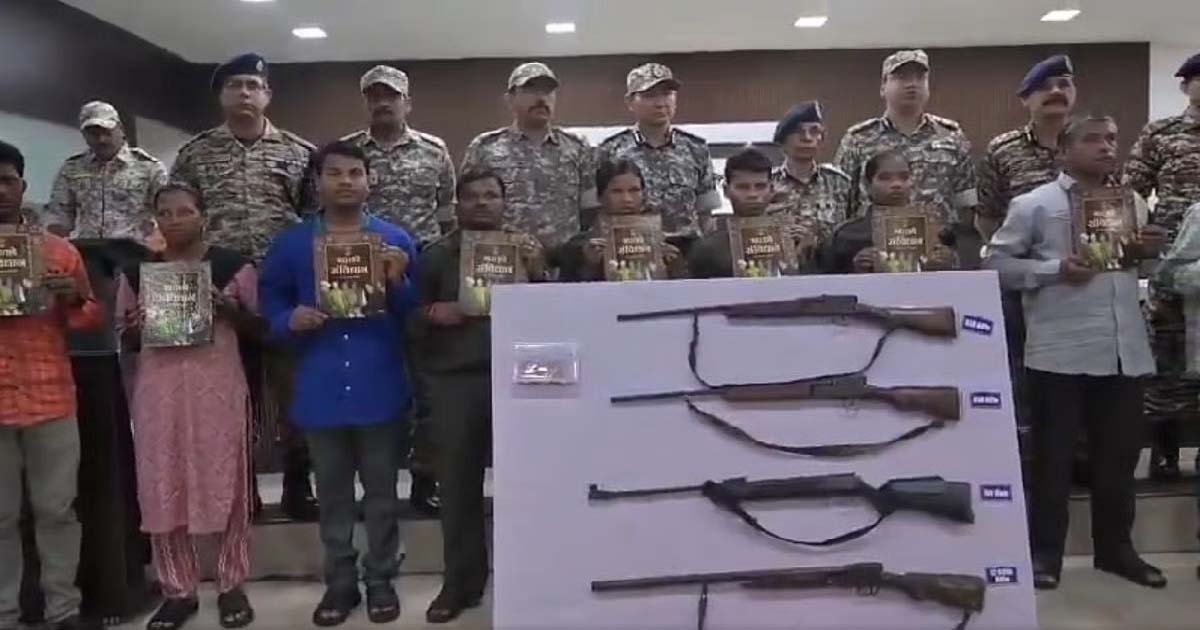
Nagpur: In yet another success to the Maharashtra government’s campaign to end left-wing extremism, 11 CPI (Maoist) commanders and cadres carrying a cumulative bounty of ₹82 lakh surrendered before the Gadchiroli police on Wednesday morning in the presence of Director General of Police Rashmi Shukla.
The surrendered group includes several high-ranking leaders — Divisional Committee Members, Platoon Committee Members and Area Committee Members — marking one of the most significant mass surrenders in recent years. Security was tightened at the venue as four of the Maoists arrived armed and in full uniform.
Among those who surrendered were Ramesh alias Baju Lekami and Bhima alias Kiran Hidma Kowasi, both Divisional Committee Members of the banned outfit. Senior Platoon Committee members Poriya alias Lucky Adama Gota, Ratan alias Sanna Masu Oyam, and Kamala alias Rago Iriya Veladi also laid down arms. Others include Poriya alias Kumari Bhima Veladi, Ramji alias Mura Lachhu Pungati, Sonu Podiyam alias Ajay, Prakash alias Pandu Pungati, Sita alias Jaini Tonde Pallo, and Sainath Shankar Made.
Local officials believe the surrender has delivered a major blow to Maoist operations across the Dandakaranya region, spanning Chhattisgarh, Maharashtra and Telangana. The event was attended by Additional Director General (Special Actions) Dr Tshering Dorje, DIG Ankit Goyal, DIG (CRPF) Ajay Kumar Sharma and Superintendent of Police Neelotpal.
Wednesday’s surrender is being hailed as one of the biggest successes for Gadchiroli police since Bhupathi alias Mallojula Venugopal Rao, a Politburo member of the CPI (Maoist), surrendered before Chief Minister Devendra Fadnavis on October 15 along with 60 others.
“This is the beginning of the end of Naxalism in Gadchiroli. We are committed to the Union government’s deadline of March 31, 2026, to eliminate leftwing extremism from India,” DGP Rashmi Shukla said, adding that over 100 Maoists have surrendered in Gadchiroli district this year.
Business
BSE launches 4 new BSE 100 large-cap TMC universe factor indices

New Delhi, Dec 10: The Bombay Stock Exchange’s (BSE) subsidiary BSE Index Service on Wednesday announced the launch of four new factor Indices from the universe of BSE large-cap total market capitalisation (TMC) index with 5 per cent stock level capping.
The newly introduced indices are BSE large-cap 100 momentum 30, BSE large-cap 100 low volatility 30, BSE large-cap 100 enhanced value 30, and BSE large-cap 100 quality 30.
“BSE Index Services Pvt. Ltd., a wholly owned subsidiary of BSE, today announced the launch of 4 new BSE factor indices from the BSE 100 large cap TMC index as the universe with 5 per cent stock level capping,” the exchange said in a press release.
These Indices are Reconstituted Quarterly, have a base value of 1000, and the first value date is June 20, 2005, along with the additional screening for the liquidity profile, the release added.
BSE large-cap 100 Momentum 30 will track the performance of the 30 companies in the BSE 100 large-cap TMC that exhibit the most persistence in their relative performance, based on their momentum scores. Constituents are weighted based on their momentum score.
BSE large-cap 100 Low Volatility 30 will measure the performance of the 30 least volatile companies in the BSE 100 large-cap TMC. Constituents are weighted by their inverse volatility.
BSE large-cap 100 Enhanced Value 30 measures the performance of the 30 companies in the BSE 100 large-cap TMC with the most attractive valuations, based on their value scores. Constituents are weighted based on their value score.
BSE large-cap 100 Quality 30 measures the performance of the 30 companies in the BSE 100 large-cap TMC that exhibit the most persistence in their relative performance, based on their momentum scores. Constituents are weighted based on their momentum score.
“Building on the success of factor launches on the BSE 500 universe earlier in the year, we are pleased to expand our factor family with the launch of four new factor indices, this time on the large-cap universe,” BSE Index Services Pvt. Ltd MD & CEO Ashutosh Singh said.
“These indices, in the same vein as our BSE 500 universe factor family, will be reset on a quarterly basis with the introduction of an innovative score-based only weighting method,” he added.
The index said that these new indices can be used for running passive strategies such as ETFs and Index Funds.
It can also be used for benchmarking of PMS strategies, MF schemes and fund portfolios. Additionally, investors can now access a broader spectrum of market opportunities, further enriching their investment strategies with this latest addition to BSE’s suite of indices.
-

 Crime3 years ago
Crime3 years agoClass 10 student jumps to death in Jaipur
-

 Maharashtra1 year ago
Maharashtra1 year agoMumbai Local Train Update: Central Railway’s New Timetable Comes Into Effect; Check Full List Of Revised Timings & Stations
-

 Maharashtra1 year ago
Maharashtra1 year agoMumbai To Go Toll-Free Tonight! Maharashtra Govt Announces Complete Toll Waiver For Light Motor Vehicles At All 5 Entry Points Of City
-

 Maharashtra1 year ago
Maharashtra1 year agoFalse photo of Imtiaz Jaleel’s rally, exposing the fooling conspiracy
-

 National News1 year ago
National News1 year agoMinistry of Railways rolls out Special Drive 4.0 with focus on digitisation, cleanliness, inclusiveness and grievance redressal
-

 Maharashtra1 year ago
Maharashtra1 year agoMaharashtra Elections 2024: Mumbai Metro & BEST Services Extended Till Midnight On Voting Day
-

 National News1 year ago
National News1 year agoJ&K: 4 Jawans Killed, 28 Injured After Bus Carrying BSF Personnel For Poll Duty Falls Into Gorge In Budgam; Terrifying Visuals Surface
-

 Crime1 year ago
Crime1 year agoBaba Siddique Murder: Mumbai Police Unable To Get Lawrence Bishnoi Custody Due To Home Ministry Order, Says Report





